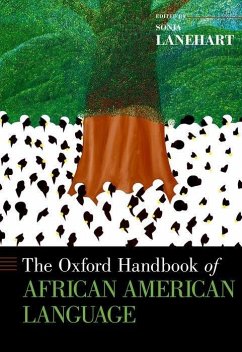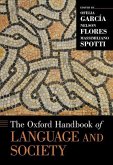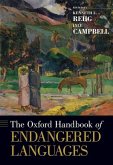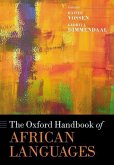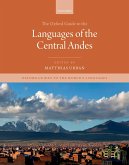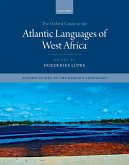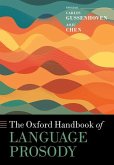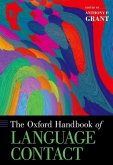Oxford Handbook of African American Language
Herausgeber: Lanehart, Sonja
Oxford Handbook of African American Language
Herausgeber: Lanehart, Sonja
- Gebundenes Buch
- Merkliste
- Auf die Merkliste
- Bewerten Bewerten
- Teilen
- Produkt teilen
- Produkterinnerung
- Produkterinnerung
The goal of The Oxford Handbook of African American Language is to provide readers with a wide range of analyses of both traditional and contemporary work on language use in African American communities in a broad collective.
Andere Kunden interessierten sich auch für
![Oxford Handbook of Language and Society Oxford Handbook of Language and Society]() Oxford Handbook of Language and Society238,99 €
Oxford Handbook of Language and Society238,99 €![Oxford Handbook of Endangered Languages Oxford Handbook of Endangered Languages]() Oxford Handbook of Endangered Languages258,99 €
Oxford Handbook of Endangered Languages258,99 €![The Oxford Handbook of African Languages The Oxford Handbook of African Languages]() The Oxford Handbook of African Languages292,99 €
The Oxford Handbook of African Languages292,99 €![Oxford Guide to the Languages of the Central Andes Oxford Guide to the Languages of the Central Andes]() Oxford Guide to the Languages of the Central Andes267,99 €
Oxford Guide to the Languages of the Central Andes267,99 €![The Oxford Guide to the Atlantic Languages of West Africa The Oxford Guide to the Atlantic Languages of West Africa]() The Oxford Guide to the Atlantic Languages of West Africa226,99 €
The Oxford Guide to the Atlantic Languages of West Africa226,99 €![The Oxford Handbook of Language Prosody The Oxford Handbook of Language Prosody]() The Oxford Handbook of Language Prosody256,99 €
The Oxford Handbook of Language Prosody256,99 €![The Oxford Handbook of Language Contact The Oxford Handbook of Language Contact]() The Oxford Handbook of Language Contact258,99 €
The Oxford Handbook of Language Contact258,99 €-
-
-
The goal of The Oxford Handbook of African American Language is to provide readers with a wide range of analyses of both traditional and contemporary work on language use in African American communities in a broad collective.
Hinweis: Dieser Artikel kann nur an eine deutsche Lieferadresse ausgeliefert werden.
Hinweis: Dieser Artikel kann nur an eine deutsche Lieferadresse ausgeliefert werden.
Produktdetails
- Produktdetails
- Verlag: Oxford University Press
- Seitenzahl: 944
- Erscheinungstermin: 1. Juni 2015
- Englisch
- Abmessung: 254mm x 180mm x 53mm
- Gewicht: 1724g
- ISBN-13: 9780199795390
- ISBN-10: 0199795398
- Artikelnr.: 47868580
- Herstellerkennzeichnung
- Libri GmbH
- Europaallee 1
- 36244 Bad Hersfeld
- 06621 890
- Verlag: Oxford University Press
- Seitenzahl: 944
- Erscheinungstermin: 1. Juni 2015
- Englisch
- Abmessung: 254mm x 180mm x 53mm
- Gewicht: 1724g
- ISBN-13: 9780199795390
- ISBN-10: 0199795398
- Artikelnr.: 47868580
- Herstellerkennzeichnung
- Libri GmbH
- Europaallee 1
- 36244 Bad Hersfeld
- 06621 890
Sonja Lanehart is Professor and Brackenridge Endowed Chair in Literature and the Humanities at the University of Texas at San Antonio.
* Language Use in African American Communities: An Introduction
* Sonja L. Lanehart, Jennifer Bloomquist, and Ayesha M. Malik
* PART I. ORIGINS AND HISTORICAL PERSPECTIVES
* The English Origins Hypothesis
* Gerard Van Herk
* The Creole Origins Hypothesis
* John R. Rickford
* The Emergence of African American English: Monogenetic or
Polygenetic? With or Without "Decreolization"? Under How Much
Substrate Influence?
* Salikoko S. Mufwene
* On the Origins of African American Vernacular English: Beginnings
* Donald Winford
* African American English Over Yonder: The Language of the Liberian
Settler Community
* John Victor Singler
* Documenting the History of African American Vernacular English: A
Survey and Assessment of Sources and Results
* Edgar W. Schneider
* Regionality in the Development of African American English
* Walt Wolfram and Mary E. Kohn
* PART II. LECTS AND VARIATION
* The Place of Gullah in the African American Linguistic Continuum
* Tracey L. Weldon and Simanique Moody
* Rural African American Vernacular English
* Patricia Cukor-Avila and Guy Bailey
* African American English in the Mississippi Delta: A Case Study of
Copula Absence and /r/-Lessness in the Speech of Black Women in
Coahoma County
* Rose Wilkerson
* African American Voices in Atlanta
* William A. Kretzschmar
* African American Language in Pittsburgh and the Lower Susqueshanna
Valley
* Jennifer Bloomquist and Shelome Gooden
* African American Phonology in a Philadelphia Community
* William Labov and Sabriya Fisher
* African American Language in New York City
* Renée A. Blake, Cara Shousterman, and Luiza Newlin-Lukowicz
* African American Vernacular English In California: Four Plus Decades
Of Vibrant Variationist Research
* John R. Rickford
* The Black American Sign Language Project: An Overview
* Joseph Hill, Carolyn McCaskill, Robert Bayley, and Ceil Lucas
* The Sociolinguistic Construction of African American Language
* Walt Wolfram
* PART III. STRUCTURE AND DESCRIPTION
* Syntax and Semantics
* Lisa J. Green and Walter Sistrunk
* The Systematic Marking of Tense, Modality and Aspect in African
American Language
* Charles E. DeBose
* On the Syntax-Prosody Interface in African American Language James A.
Walker
* Segmental Phonology of African American English
* Erik R. Thomas and Guy Bailey
* Prosodic Features of African American English
* Erik R. Thomas
* PART IV. CHILD LANGUAGE ACQUISITION AND DEVELOPMENT
* Language Acquisition in the African American Child: Prior to Age Four
* Brandi L. Newkirk-Turner, RaMonda Horton, and Ida J. Stockman
* The Development of African American English through Childhood and
Adolescence
* Janneke Van Hofwegen
* Development of Variation
* Lisa J. Green and Jessica White-Sustaíta
* Narrative Structures of African American Children: Commonalities and
Differences
* Tempii B. Champion and Allyssa McCabe
* Some Similarities and Differences between African American English
and Southern White English in Children Janna B. Oetting
* Contemporary Approaches and Perspectives for Assessing Young and
School-Age AAE Child Speakers
* Toya A. Wyatt
* PART V. EDUCATION
* African American Language and Education: History and Controversy in
the Twentieth Century
* Geneva Smitherman
* Managing Two Varieties: Code-switching in the Educational Context
* Monique T. Mills and Julie A. Washington
* Balancing Pedagogy with Theory: The Infusion of African American
Language Research Into Everyday Pre K-12 Teaching Practices
* Sharroky Hollie, Tamara Butler, and Jamila Gillenwaters
* History of Research on Multiliteracies and Hip Hop Pedagogy: A
Critical Review
* K.C. Nat Turner and Tyson L. Rose
* African-American Vernacular English and Reading
* William Labov and Bettina Baker
* Dialect Switching and Mathematical Reasoning Tests: Implications for
Early Educational Achievement
* J. Michael Terry, Randall Hendrick, Evangelos Evangelou, and Richard
L. Smith
* Beyond Bidialecticalism: Language Planning and Policies for African
American Students
* John Baugh
* PART VI. LANGUAGE IN SOCIETY
* African American Church Language
* Charles E. DeBose
* The (Re)turn to Remus Orthography: The Voices of African American
Language in American Literature
* James Braxton Peterson
* African American Language and Black Poetry
* Howard Rambsy II and Briana Whiteside
* African American Divas of Comedy: Staking a Claim in Public Space
* Jacquelyn Rahman
* The Construction of Ethnicity via Voicing: African American English
in Children's Animated Film
* Jennifer Bloomquist
* SWB: (Speaking while Black or Speaking while Brown): Linguistic
Profiling and Discrimination Based on Speech as a Surrogate for Race
in International Perspective
* John Baugh
* PART VII. LANGUAGE AND IDENTITY
* Racializing Language: Unpacking Linguistic Approaches to Attitudes
about Race and Speech
* Kate T. Anderson
* African American Standard English
* Arthur K. Spears
* African American English in the Middle Class
* Erica Britt and Tracey L. Weldon
* African American Women's Language: Mother Tongues Untied
* Marcyliena Morgan
* Black Masculine Language
* David E. Kirkland
* Hip Hop Nation Language: Localization and Globalization
* H. Samy Alim
* African American Language and Identity: Contradictions and Conundrums
* Sonja L. Lanehart
* Sonja L. Lanehart, Jennifer Bloomquist, and Ayesha M. Malik
* PART I. ORIGINS AND HISTORICAL PERSPECTIVES
* The English Origins Hypothesis
* Gerard Van Herk
* The Creole Origins Hypothesis
* John R. Rickford
* The Emergence of African American English: Monogenetic or
Polygenetic? With or Without "Decreolization"? Under How Much
Substrate Influence?
* Salikoko S. Mufwene
* On the Origins of African American Vernacular English: Beginnings
* Donald Winford
* African American English Over Yonder: The Language of the Liberian
Settler Community
* John Victor Singler
* Documenting the History of African American Vernacular English: A
Survey and Assessment of Sources and Results
* Edgar W. Schneider
* Regionality in the Development of African American English
* Walt Wolfram and Mary E. Kohn
* PART II. LECTS AND VARIATION
* The Place of Gullah in the African American Linguistic Continuum
* Tracey L. Weldon and Simanique Moody
* Rural African American Vernacular English
* Patricia Cukor-Avila and Guy Bailey
* African American English in the Mississippi Delta: A Case Study of
Copula Absence and /r/-Lessness in the Speech of Black Women in
Coahoma County
* Rose Wilkerson
* African American Voices in Atlanta
* William A. Kretzschmar
* African American Language in Pittsburgh and the Lower Susqueshanna
Valley
* Jennifer Bloomquist and Shelome Gooden
* African American Phonology in a Philadelphia Community
* William Labov and Sabriya Fisher
* African American Language in New York City
* Renée A. Blake, Cara Shousterman, and Luiza Newlin-Lukowicz
* African American Vernacular English In California: Four Plus Decades
Of Vibrant Variationist Research
* John R. Rickford
* The Black American Sign Language Project: An Overview
* Joseph Hill, Carolyn McCaskill, Robert Bayley, and Ceil Lucas
* The Sociolinguistic Construction of African American Language
* Walt Wolfram
* PART III. STRUCTURE AND DESCRIPTION
* Syntax and Semantics
* Lisa J. Green and Walter Sistrunk
* The Systematic Marking of Tense, Modality and Aspect in African
American Language
* Charles E. DeBose
* On the Syntax-Prosody Interface in African American Language James A.
Walker
* Segmental Phonology of African American English
* Erik R. Thomas and Guy Bailey
* Prosodic Features of African American English
* Erik R. Thomas
* PART IV. CHILD LANGUAGE ACQUISITION AND DEVELOPMENT
* Language Acquisition in the African American Child: Prior to Age Four
* Brandi L. Newkirk-Turner, RaMonda Horton, and Ida J. Stockman
* The Development of African American English through Childhood and
Adolescence
* Janneke Van Hofwegen
* Development of Variation
* Lisa J. Green and Jessica White-Sustaíta
* Narrative Structures of African American Children: Commonalities and
Differences
* Tempii B. Champion and Allyssa McCabe
* Some Similarities and Differences between African American English
and Southern White English in Children Janna B. Oetting
* Contemporary Approaches and Perspectives for Assessing Young and
School-Age AAE Child Speakers
* Toya A. Wyatt
* PART V. EDUCATION
* African American Language and Education: History and Controversy in
the Twentieth Century
* Geneva Smitherman
* Managing Two Varieties: Code-switching in the Educational Context
* Monique T. Mills and Julie A. Washington
* Balancing Pedagogy with Theory: The Infusion of African American
Language Research Into Everyday Pre K-12 Teaching Practices
* Sharroky Hollie, Tamara Butler, and Jamila Gillenwaters
* History of Research on Multiliteracies and Hip Hop Pedagogy: A
Critical Review
* K.C. Nat Turner and Tyson L. Rose
* African-American Vernacular English and Reading
* William Labov and Bettina Baker
* Dialect Switching and Mathematical Reasoning Tests: Implications for
Early Educational Achievement
* J. Michael Terry, Randall Hendrick, Evangelos Evangelou, and Richard
L. Smith
* Beyond Bidialecticalism: Language Planning and Policies for African
American Students
* John Baugh
* PART VI. LANGUAGE IN SOCIETY
* African American Church Language
* Charles E. DeBose
* The (Re)turn to Remus Orthography: The Voices of African American
Language in American Literature
* James Braxton Peterson
* African American Language and Black Poetry
* Howard Rambsy II and Briana Whiteside
* African American Divas of Comedy: Staking a Claim in Public Space
* Jacquelyn Rahman
* The Construction of Ethnicity via Voicing: African American English
in Children's Animated Film
* Jennifer Bloomquist
* SWB: (Speaking while Black or Speaking while Brown): Linguistic
Profiling and Discrimination Based on Speech as a Surrogate for Race
in International Perspective
* John Baugh
* PART VII. LANGUAGE AND IDENTITY
* Racializing Language: Unpacking Linguistic Approaches to Attitudes
about Race and Speech
* Kate T. Anderson
* African American Standard English
* Arthur K. Spears
* African American English in the Middle Class
* Erica Britt and Tracey L. Weldon
* African American Women's Language: Mother Tongues Untied
* Marcyliena Morgan
* Black Masculine Language
* David E. Kirkland
* Hip Hop Nation Language: Localization and Globalization
* H. Samy Alim
* African American Language and Identity: Contradictions and Conundrums
* Sonja L. Lanehart
* Language Use in African American Communities: An Introduction
* Sonja L. Lanehart, Jennifer Bloomquist, and Ayesha M. Malik
* PART I. ORIGINS AND HISTORICAL PERSPECTIVES
* The English Origins Hypothesis
* Gerard Van Herk
* The Creole Origins Hypothesis
* John R. Rickford
* The Emergence of African American English: Monogenetic or
Polygenetic? With or Without "Decreolization"? Under How Much
Substrate Influence?
* Salikoko S. Mufwene
* On the Origins of African American Vernacular English: Beginnings
* Donald Winford
* African American English Over Yonder: The Language of the Liberian
Settler Community
* John Victor Singler
* Documenting the History of African American Vernacular English: A
Survey and Assessment of Sources and Results
* Edgar W. Schneider
* Regionality in the Development of African American English
* Walt Wolfram and Mary E. Kohn
* PART II. LECTS AND VARIATION
* The Place of Gullah in the African American Linguistic Continuum
* Tracey L. Weldon and Simanique Moody
* Rural African American Vernacular English
* Patricia Cukor-Avila and Guy Bailey
* African American English in the Mississippi Delta: A Case Study of
Copula Absence and /r/-Lessness in the Speech of Black Women in
Coahoma County
* Rose Wilkerson
* African American Voices in Atlanta
* William A. Kretzschmar
* African American Language in Pittsburgh and the Lower Susqueshanna
Valley
* Jennifer Bloomquist and Shelome Gooden
* African American Phonology in a Philadelphia Community
* William Labov and Sabriya Fisher
* African American Language in New York City
* Renée A. Blake, Cara Shousterman, and Luiza Newlin-Lukowicz
* African American Vernacular English In California: Four Plus Decades
Of Vibrant Variationist Research
* John R. Rickford
* The Black American Sign Language Project: An Overview
* Joseph Hill, Carolyn McCaskill, Robert Bayley, and Ceil Lucas
* The Sociolinguistic Construction of African American Language
* Walt Wolfram
* PART III. STRUCTURE AND DESCRIPTION
* Syntax and Semantics
* Lisa J. Green and Walter Sistrunk
* The Systematic Marking of Tense, Modality and Aspect in African
American Language
* Charles E. DeBose
* On the Syntax-Prosody Interface in African American Language James A.
Walker
* Segmental Phonology of African American English
* Erik R. Thomas and Guy Bailey
* Prosodic Features of African American English
* Erik R. Thomas
* PART IV. CHILD LANGUAGE ACQUISITION AND DEVELOPMENT
* Language Acquisition in the African American Child: Prior to Age Four
* Brandi L. Newkirk-Turner, RaMonda Horton, and Ida J. Stockman
* The Development of African American English through Childhood and
Adolescence
* Janneke Van Hofwegen
* Development of Variation
* Lisa J. Green and Jessica White-Sustaíta
* Narrative Structures of African American Children: Commonalities and
Differences
* Tempii B. Champion and Allyssa McCabe
* Some Similarities and Differences between African American English
and Southern White English in Children Janna B. Oetting
* Contemporary Approaches and Perspectives for Assessing Young and
School-Age AAE Child Speakers
* Toya A. Wyatt
* PART V. EDUCATION
* African American Language and Education: History and Controversy in
the Twentieth Century
* Geneva Smitherman
* Managing Two Varieties: Code-switching in the Educational Context
* Monique T. Mills and Julie A. Washington
* Balancing Pedagogy with Theory: The Infusion of African American
Language Research Into Everyday Pre K-12 Teaching Practices
* Sharroky Hollie, Tamara Butler, and Jamila Gillenwaters
* History of Research on Multiliteracies and Hip Hop Pedagogy: A
Critical Review
* K.C. Nat Turner and Tyson L. Rose
* African-American Vernacular English and Reading
* William Labov and Bettina Baker
* Dialect Switching and Mathematical Reasoning Tests: Implications for
Early Educational Achievement
* J. Michael Terry, Randall Hendrick, Evangelos Evangelou, and Richard
L. Smith
* Beyond Bidialecticalism: Language Planning and Policies for African
American Students
* John Baugh
* PART VI. LANGUAGE IN SOCIETY
* African American Church Language
* Charles E. DeBose
* The (Re)turn to Remus Orthography: The Voices of African American
Language in American Literature
* James Braxton Peterson
* African American Language and Black Poetry
* Howard Rambsy II and Briana Whiteside
* African American Divas of Comedy: Staking a Claim in Public Space
* Jacquelyn Rahman
* The Construction of Ethnicity via Voicing: African American English
in Children's Animated Film
* Jennifer Bloomquist
* SWB: (Speaking while Black or Speaking while Brown): Linguistic
Profiling and Discrimination Based on Speech as a Surrogate for Race
in International Perspective
* John Baugh
* PART VII. LANGUAGE AND IDENTITY
* Racializing Language: Unpacking Linguistic Approaches to Attitudes
about Race and Speech
* Kate T. Anderson
* African American Standard English
* Arthur K. Spears
* African American English in the Middle Class
* Erica Britt and Tracey L. Weldon
* African American Women's Language: Mother Tongues Untied
* Marcyliena Morgan
* Black Masculine Language
* David E. Kirkland
* Hip Hop Nation Language: Localization and Globalization
* H. Samy Alim
* African American Language and Identity: Contradictions and Conundrums
* Sonja L. Lanehart
* Sonja L. Lanehart, Jennifer Bloomquist, and Ayesha M. Malik
* PART I. ORIGINS AND HISTORICAL PERSPECTIVES
* The English Origins Hypothesis
* Gerard Van Herk
* The Creole Origins Hypothesis
* John R. Rickford
* The Emergence of African American English: Monogenetic or
Polygenetic? With or Without "Decreolization"? Under How Much
Substrate Influence?
* Salikoko S. Mufwene
* On the Origins of African American Vernacular English: Beginnings
* Donald Winford
* African American English Over Yonder: The Language of the Liberian
Settler Community
* John Victor Singler
* Documenting the History of African American Vernacular English: A
Survey and Assessment of Sources and Results
* Edgar W. Schneider
* Regionality in the Development of African American English
* Walt Wolfram and Mary E. Kohn
* PART II. LECTS AND VARIATION
* The Place of Gullah in the African American Linguistic Continuum
* Tracey L. Weldon and Simanique Moody
* Rural African American Vernacular English
* Patricia Cukor-Avila and Guy Bailey
* African American English in the Mississippi Delta: A Case Study of
Copula Absence and /r/-Lessness in the Speech of Black Women in
Coahoma County
* Rose Wilkerson
* African American Voices in Atlanta
* William A. Kretzschmar
* African American Language in Pittsburgh and the Lower Susqueshanna
Valley
* Jennifer Bloomquist and Shelome Gooden
* African American Phonology in a Philadelphia Community
* William Labov and Sabriya Fisher
* African American Language in New York City
* Renée A. Blake, Cara Shousterman, and Luiza Newlin-Lukowicz
* African American Vernacular English In California: Four Plus Decades
Of Vibrant Variationist Research
* John R. Rickford
* The Black American Sign Language Project: An Overview
* Joseph Hill, Carolyn McCaskill, Robert Bayley, and Ceil Lucas
* The Sociolinguistic Construction of African American Language
* Walt Wolfram
* PART III. STRUCTURE AND DESCRIPTION
* Syntax and Semantics
* Lisa J. Green and Walter Sistrunk
* The Systematic Marking of Tense, Modality and Aspect in African
American Language
* Charles E. DeBose
* On the Syntax-Prosody Interface in African American Language James A.
Walker
* Segmental Phonology of African American English
* Erik R. Thomas and Guy Bailey
* Prosodic Features of African American English
* Erik R. Thomas
* PART IV. CHILD LANGUAGE ACQUISITION AND DEVELOPMENT
* Language Acquisition in the African American Child: Prior to Age Four
* Brandi L. Newkirk-Turner, RaMonda Horton, and Ida J. Stockman
* The Development of African American English through Childhood and
Adolescence
* Janneke Van Hofwegen
* Development of Variation
* Lisa J. Green and Jessica White-Sustaíta
* Narrative Structures of African American Children: Commonalities and
Differences
* Tempii B. Champion and Allyssa McCabe
* Some Similarities and Differences between African American English
and Southern White English in Children Janna B. Oetting
* Contemporary Approaches and Perspectives for Assessing Young and
School-Age AAE Child Speakers
* Toya A. Wyatt
* PART V. EDUCATION
* African American Language and Education: History and Controversy in
the Twentieth Century
* Geneva Smitherman
* Managing Two Varieties: Code-switching in the Educational Context
* Monique T. Mills and Julie A. Washington
* Balancing Pedagogy with Theory: The Infusion of African American
Language Research Into Everyday Pre K-12 Teaching Practices
* Sharroky Hollie, Tamara Butler, and Jamila Gillenwaters
* History of Research on Multiliteracies and Hip Hop Pedagogy: A
Critical Review
* K.C. Nat Turner and Tyson L. Rose
* African-American Vernacular English and Reading
* William Labov and Bettina Baker
* Dialect Switching and Mathematical Reasoning Tests: Implications for
Early Educational Achievement
* J. Michael Terry, Randall Hendrick, Evangelos Evangelou, and Richard
L. Smith
* Beyond Bidialecticalism: Language Planning and Policies for African
American Students
* John Baugh
* PART VI. LANGUAGE IN SOCIETY
* African American Church Language
* Charles E. DeBose
* The (Re)turn to Remus Orthography: The Voices of African American
Language in American Literature
* James Braxton Peterson
* African American Language and Black Poetry
* Howard Rambsy II and Briana Whiteside
* African American Divas of Comedy: Staking a Claim in Public Space
* Jacquelyn Rahman
* The Construction of Ethnicity via Voicing: African American English
in Children's Animated Film
* Jennifer Bloomquist
* SWB: (Speaking while Black or Speaking while Brown): Linguistic
Profiling and Discrimination Based on Speech as a Surrogate for Race
in International Perspective
* John Baugh
* PART VII. LANGUAGE AND IDENTITY
* Racializing Language: Unpacking Linguistic Approaches to Attitudes
about Race and Speech
* Kate T. Anderson
* African American Standard English
* Arthur K. Spears
* African American English in the Middle Class
* Erica Britt and Tracey L. Weldon
* African American Women's Language: Mother Tongues Untied
* Marcyliena Morgan
* Black Masculine Language
* David E. Kirkland
* Hip Hop Nation Language: Localization and Globalization
* H. Samy Alim
* African American Language and Identity: Contradictions and Conundrums
* Sonja L. Lanehart

